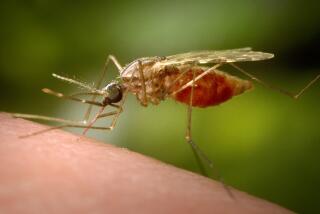AIDS Vaccine Effective in Chimps, Study Finds
- Share via
Chimpanzees inoculated with an experimental AIDS vaccine have successfully fought off repeated exposures to the AIDS virus up to a year after they were vaccinated, a research team reported Sunday.
The novel vaccine, which consists of a series of nasal sprays followed weeks later by a booster shot in the arm, is the latest addition to a small but growing arsenal of experimental AIDS vaccines showing early signs of promise after many years of mostly disappointing results.
Scientists cautioned that other vaccines have looked similarly effective in chimpanzees, only to fail in human clinical trials. But researchers said they were encouraged by the strength of the immune response triggered by this vaccine.
The new vaccine was made from an adenovirus--a kind of virus that can cause colds in people--that was genetically engineered to contain an extra gene called gp160, normally found only in HIV. When sprayed into the nasal passages of chimps, the modified virus settled into the animals’ upper respiratory tracts and intestines.
During the next week or so, the viruses multiplied in the chimps’ mucous membranes and spewed out gp160 proteins. As predicted, the chimps’ immune systems responded to the HIV proteins by making antibodies and white blood cells programmed to attack HIV.
The researchers boosted that protective immune response by giving the chimps a shot in the arm containing laboratory-made versions of a different HIV protein, gp120. More than 11 months later, they subjected the chimps to intravenous infusions of HIV.
Study leader Marjorie Robert-Guroff of the National Cancer Institute and her colleagues reported in the June issue of Nature Medicine, released Sunday, that unvaccinated chimps became infected with the deadly virus within a month but that vaccinated chimps remained healthy and apparently uninfected until the study ended, almost a year later.
More to Read
Sign up for Essential California
The most important California stories and recommendations in your inbox every morning.
You may occasionally receive promotional content from the Los Angeles Times.









